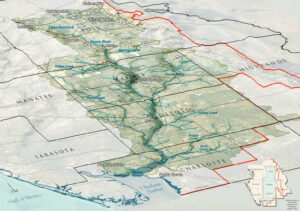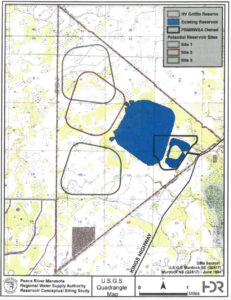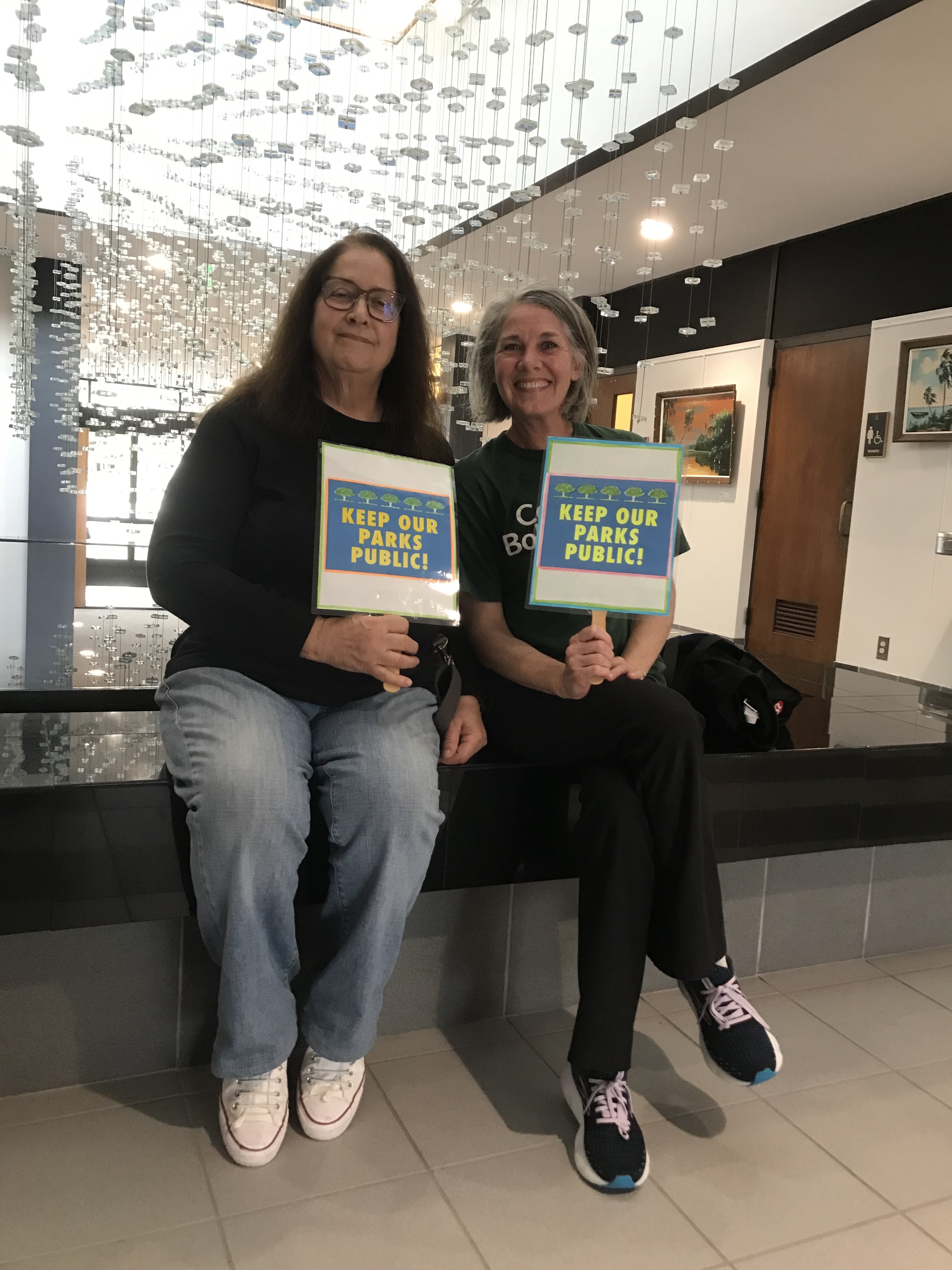In contrast to the City of Sarasota, re-use of treatment plant water is not being considered.
By Florence Fahringer
Original Air Date: Mar. 22, 2024
Host: Suburbs in Sarasota County are sprawling, and that means we will need an additional 12 million gallons of water a day. On Tuesday, the Sarasota County Commission took a $300 million-plus decision in that regard. Unlike the City of Sarasota, the county is not considering the reuse of water coming out of treatment plants. Instead, we are going to pump more of our drinking water from a watershed beyond county limits. Florence Fahringer followed the discussion.
Florence Fahringer: This past Tuesday, the Sarasota County Commission talked about water. Specifically, the county’s plans for acquiring the amount of water needed should its projected growth come to pass. The last time this was brought up was in November of last year, where the outgoing public utilities director spoke on the matter in an urgent tone. His successor, Brooke Bailey, was more reassuring.
Brooke Bailey: So looking at the region as a whole, if we take a step back, the [Peace River Water] Authority actually has five customers. Of those customers, if you look at the next 20 years, this is what those five customers have already projected. You can see at the very bottom, there are 22.5 million gallons, and again that’s additional water supply over the next 20 years that the region is asking the Authority for.
FF: Bailey outlined the two projects the Peace River Authority is planning on undertaking in the next few decades: Building a third surface water retention reservoir, and brackish water reverse osmosis.

Getting water from beyond county limits: Peace River watershed.
BB: Peace River has different projects that they could pursue, and going through these projects really over the next 20 years. Both of the projects will have to be done. It’s just whether which one comes first. So with both of these projects, there’s really two phases. One is pretty much where the water is coming from, and then the second phase is how we’re going to treat it. So the surface water treatment plant expansion project will be coming from the Peace River. It goes into a reservoir that’s 9 billion gallons. And then the expansion pretty much expands the Peace River facility as it is now. A lot of the treatment techniques will be similar to currently what’s existing, the average yield of this facility, to have reliability and resiliency of the system. It will yield 18 MGD [million gallons a day]. Now looking at the approximate cost for this project. So the cost is a total of $540 million. Grant funding has been secured already for this project, at 133 million. So depending on what customers decide that they want, really allocations from this project, it would come to $370 million. Again, it would be a percentage of that for who would buy into that share. Looking at the other project that they’re proposing is the brackish RO. So this would actually have groundwater wells involved. There’d be 15 groundwater wells, along with a treatment process that would be reverse osmosis. That would only yield 8 million gallons a day. At this time, there is no grant funding secured for this project. And so because of that, its costs to the customers would be around $284 million.
FF: Interestingly enough, Bailey pointed out an unexpected opportunity for Sarasota County should it beat its neighbors in the race for Peace River waters.

Peace River Water Authority’s options to locate a third reservoir.
BB: One other thing that I want to look at as well, or show you guys: Charlotte County, North Port at this time, have not asked for any allocations. So with that, the project that I just showed you, with the 18 MGD facility, we could be on the hook for 17 MGD of it, since no other customers have asked for anything but DeSoto County. So with 17, if you have 17 times the $20.6 million, that would cost the county $350 million. And again, looking at the brackish RO, if we did the brackish water prior to the surface, it would be about the same cost, however, 5 million gallons less with the 17. Right now in our 20-year span, we’re projecting only 12 MGD in demand. So with that 17, we would have the opportunity to sell to the other customers around 5 MGD.
FF: Commissioners all had good things to say about the proposal.
Neil Rainford: I want to talk about the slide actually that’s right up there currently, the 12 and the 17. So regardless at a period in the not too distant future, these numbers kind of even out, no matter which direction we go to that $350 million range. If at this point our partners decide not to participate in the total 17 and we become in charge of that, we get to sell them their water. Is that accurate?
BB: That is accurate.
NR: Okay. So in a little bit of a way, I’m kind of hoping that they don’t participate now, because we know they’re going to need it later, and they might end up being more cost effective to our our citizens.
Ron Cutsinger: This morning, Commissioner Moran was talking about core functions of the county. I can’t think of anything that’s more core than the water supply. And so this is certainly something that we need to be able to take bold decisions on, looking not at next year or five years, but looking 20-25 years down the road. And it seems quite obvious, very clear to me that the surface water project is the way to get more water, less dollars per million gallons, more future availability. Also, I think surface water is easier to treat than RO, and don’t need the injection wells and all that associated with with RO. So it just makes a lot of sense to move forward and I have to concur. I’d rather be someone that has it to sell rather than looking around who we’re gonna buy it from.
Joe Neunder: I won’t add too much. … I will speak to the reverse osmosis component of the equation. I happen to be a reverse osmosis customer in the City of Venice. And as I’m sure you’re aware, and for the benefit of my colleagues, there’s a bladder system that filtrates. It does not give you 100% efficiency, there’s some 50% effectiveness, 75% effectiveness. So, I would agree … that this surface water treatment is in fact the best option for us to move forward. And I’m a little surprised. Can North Port, can they come back in, or is the time passed for them to come to the table on this, or are we first to eat here?
BB: So how I understand it, Charlotte is looking at their board next week, essentially. North Port, I do not have any more information on them. … Pretty much, the next step is, it actually goes to the Authority Board on the first week of April. And so at that point is when the numbers will pretty much show who’s taking the capacity.
JN: Okay, great.
FF: Predictably, Bailey got the go-ahead from the commissioners to pursue the deal with the Peace River Authority. This go-around echoed last year’s in many ways, though the sense of urgency was much diminished. Bailey and the commission seem not only confident in the Peace River Authority’s ability to provide enough water for the county for the next twenty years, but also confident enough in the reliability of this water supply that they’re even speculating about beating North Port and Charlotte County to the chase, selling a water surplus to their neighbors. Also similar to last time, there was no mention made of re-use — a method which can be likened to “recycling” wastewater.
And though more than one commissioner fashions themselves a hawkish defender of the taxpayer’s wallet, there was little scrutiny when it came to these $300 million tax dollars. The commission is for now in unanimous and placid agreement: come hell or high water, more and more Sarasota faucets will run Peace River water.
This is Florence Fahringer, reporting for WSLR News.
WSLR News aims to keep the local community informed with our 1/2 hour local news show, quarterly newspaper and social media feeds. The local news broadcast airs on Wednesdays and Fridays at 6pm.
